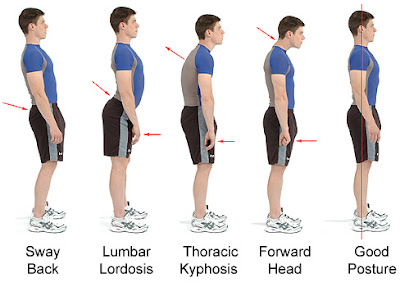Postural Deviation

Our posture is a reflection of how we adapt to the life we’re currently living, so it’s not a surprise when you see many people exhibits deviations from their neutral spine position, which can be caused by physical stress & emotional stress.
The symmetry of your body is vital to your body structure. When posture deviates too much from its acceptable range, this will impose stress and strains on your body tissues, which may lead to dysfunctions of a certain body part.
While there are hundreds of deviations that you can think of from the ideal posture, we’re only going to talk about the 5 most common postural deviations, what are the symptoms and causes behind it.
a. Lordosis
Symptoms :
Lower back pain
Excessive curve of the lumbar spine
Anterior pelvic tilt
b. Kyphosis
Symptoms :
Forward head position
Fatty neck hump
Neck & arm pain
Rounded shoulder
c. Flat Back
Symptoms :
Back, thigh & groin pain
Flat lower back curve
Sciatica
d. Sway Back
Symptoms :
Weak core muscles
Lower lumbar area is flattened
Tight hip & hamstring
Forward tilted head
Both shoulders located behind your hips
e. Scoliosis
Symptoms :
Uneven shoulder & pelvis, common among women who carries baby in one hand
There’s Nothing Wrong With Your Gene
Far too many people will blame their genes for their own problems. The truth is that a majority of musculoskeletal problems and chronic pain are caused by our modern sedentary lifestyles. How we move & eat greatly affects how we look, and the good thing is that they can be solved if we were to alter our environment. Only a small amount of cases is due to physical abnormalities present at birth.
If you were wondering why do you have an abnormal posture despite leading a pretty active lifestyle, try recall those memories and see if you have been involved in any accident before. Falls, tumbles or even scrapes can cause damage to the fragile bone, and we wouldn’t even notice it as we grow up because it gets better as we age, but eventually the process will come to a halt and the previously fractured leg will be shorter than its counterpart. Since our body is operating as one unit, if a part of the body is not align with the others, another body part will compensate to deal with the gravity, and this will affect the next muscle, and so on.
Bottomline, it’s important for you to start seeing a physical therapist if you notice something’s off with your posture, and don’t delay it until it’s too late. Just because you’re not suffering from any sort of pain right now, doesn’t mean that the underlying issue is not significant enough to cause any problem in the future.

